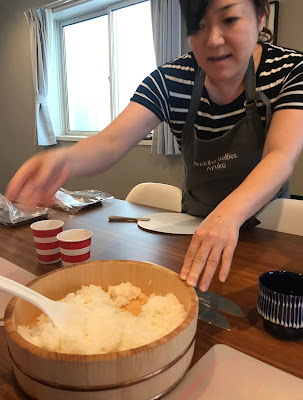Where to Workshops?
 Later this year I'm teaching a Travel Writing Bootcamp. It's a slightly ridiculous name I know, but it should sound like a way to kickstart your writing while sidestepping the traditional workshop model. Not that there's anything wrong with the traditional workshop. I still have a great creative writing workshoppping group and use workshops in most of my classes. But as Louis Menand points out in the New Yorker article, Show or Tell, we've been using workshops as a method of teaching writing for more than 50 years. In all that time shouldn't we have evolved some new tools for writing?
Later this year I'm teaching a Travel Writing Bootcamp. It's a slightly ridiculous name I know, but it should sound like a way to kickstart your writing while sidestepping the traditional workshop model. Not that there's anything wrong with the traditional workshop. I still have a great creative writing workshoppping group and use workshops in most of my classes. But as Louis Menand points out in the New Yorker article, Show or Tell, we've been using workshops as a method of teaching writing for more than 50 years. In all that time shouldn't we have evolved some new tools for writing?
Menand's essay tackles questions like can you teach writing succinctly ('What is usually said is that you can’t teach inspiration, but you can teach craft.') and gives a romping history of how creative programs grew up in the States throughout the 1940s and much later in the UK and Australia. Workshopping as a technique isn't really discussed in depth, but essentially it's the process of getting a class to share work with fellow students and encourage discussion around it. Some interesting variations are offered - "One of Rick Moody’s teachers at Columbia asked the class to indicate, by a show of hands, how many found Moody’s work boring." This is the kind of bloodsport feedback that most students just aren't ready for.
Feedback should be a deep engagement with the work. Friends and family may say they like a work, but a workshopper will say why they like the work, what techniques worked and suggest new directions. Poor feedback is prescriptive and pushes the work in the direction of the commenter. In a workshopping group, it's a fine line between cross-pollination and blandisation. So workshoppers need to bring work that can sustain criticism and have some idea of direction. Bringing fragments is fine, but a workshopping group isn't going to write a piece for you.
In classes, I've seen students who just want praise. And praise will encourage you to keep writing and give you a good idea of what works. But workshopping shouldn't just be about praise. The gushy soccer mom who tells you "Good job!" isn't going to improve your work and isn't really engaging with it. When someone uses flat statements about 'liking' or 'disliking' something they should be pursued by a facilitator, because people can like stories just because they include cats, fluffy bunnies or your favourite holiday destination. A workshop likes something because it's good writing even if it says things that your fellow workshoppers may not like.
There's a great response to Menand's article pointing out that creative writing programs have filled the gap left by publishing houses. Certainly great editors can push along a work, but as publishing is being pressured for the bottom line it's harder for editors to find time to develop work. The masterclass model which includes one-on-one feedback on your piece with a teacher is an attempt to fill the gap. The 'with feedback' model is popular but pricey. Plus while students love 'name writers', developing work is about good teaching as much as good writing and that name writer may have more instinct than information about writing. Worse still is the idea that name writer will hand you a golden cookie cutter so you can write just like them. Good teachers should encourage your voice which can be difficult if a teacher just wants to hear echoes of their own.
When I sign up to participate in a class I'm looking for something that will prioritise my writing and could offer new craft or technique. Prioritising is about saying saying this class will force me to devote time and brainspace to a piece of writing. That's what I want the bootcamp to do. It will be about offering techniques and throwing exercises at students that get them to examine their own way of writing. Will it be useful to use in media res or do their stories start somewhere else? Should you close where you start for an ouroboros effect or do you want some loose ends that a reader will answer?
And there needs to be writing, as well as chalk and talk. No class should be like one teacher Menand mentions whose "preferred pedagogical venue was the cocktail party, where he would station himself in the kitchen, near the ice trays, and consume vodka by the bottle while holding forth to the gathered disciples." Well, maybe the vodka would be a useful teaching aid. But a writing class should work towards workshopping. If you've pushed people to write there should be a chance for them to get a wider audience for it. And a well-run workshop should be one of the most helpful audiences your writing will get.
I'm keen to hear about what techniques have worked for you as a writer. Has there been inspirational teaching that has kicked your writing in a new direction? Has there been an evolution beyond workshopping? Why do you sign up for courses, workshops or masterclasses?
Image courtesy of Cardigan Press & the Great State of Iowa.




With regards to workshopping, it's really frustrating when you get in with a group and they're all at the 'let's say nice things and not engage with the text' stage. Maybe good workshopping / giving good feedback is a skill that should be taught to new writers?
ReplyDeletePS will there be weightlifting and push-ups in your bootcamp? I could stand to improve my writing skillz AND lose a few kgs. A combined approach would be highly appreciated.
Lisa, you're bang-on about the need to develop feedback skills. Usually setting up a few rules about how to give feedback in workshop helps. But also about how to receive it.
ReplyDeleteI was also thinking I should have made a distinction about 'professional writing' here, because saying nice things is fine if you're really just writing for pleasure. But I think most egotistical writers get sick of that rather soonish.
Re: the Bootcamp, there's won't be push-ups, but there will be Drop and Give Me 20s. Weight may be lost through the sheer workout the hand gets from frantic scribbling.
I'm almost not talking to you because you broke my heart with the crab.
ReplyDeleteI think workshopping is often a performance of the work (which is why I discourage reading aloud in workshopping 'polished' work), and I think a number of students can probably relate to feeling like they don't need to push it further to get it published once it's been aired in a workshop - they've had their 'audience' (I pretty much felt this the whole time I was studying creative writing). So I agree completely that it can be a flawed process.
The longer I teach university and high school groups the more I feel that what I'd like them to do is think deeply, dig deeper and deeper into one thing, rather than produce a story in 50 minutes. But most schools want the story. Alas.
I do find a lot of my uni students would like a vocab for writing (which sometimes I feel like I lack) so they can be more precise talking about structure and technique. SO when you said 'in media res' I was impressed.
This seems timely: Can writing be taught - Three Guys One Book talking about workshopping.
ReplyDelete@Penni, it's true about performance element and it is weird to perform material that needs to stand on the page.
ReplyDeleteDo you think the digging deeper can come by letting students work over a couple of sessions? I'm thinking that the 50 minute deadline is really intimidating for students, especially ones who prefer to draft and their genius comes in the re-draft.
@Lisa, great article - thanks! Writing should be teamed with reading as a method of learning about it. I write worst when I'm not reading. Would you do a program that included reading as a background to learning to write? I think I might, but I'm not sure if the reading would hit the right note.
Would you do a program that included reading as a background to learning to write? No, probably not. I read widely in the genres that I write in anyway, if I were signing up for a course it would be to get some kind of technical skills that I don't feel I could glean from reading. That said, I'm a good, critical reader - some people might not have critical reading skills.
ReplyDelete13 Ways of Looking at the Novel is a book that explores this relationship about learning how to write novels by reading and deconstructing them.
Will look out for the Jane Smiley. I agree about writers setting their own reading lists, but good to get some other input. I think your point about critical reading might be similar to Penni's - are we giving writers the right skills?
ReplyDeleteThe building up of critical skills is crucial. I also hear a lot of people saying that they're about encouraging writers to find their own voices, but criticism makes that harder if you're pulling apart someone's manuscript to see what makes it tick.